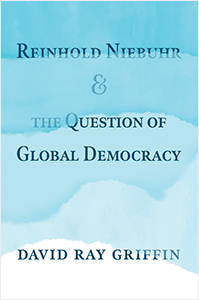David Ray Griffin
 Modern imperialism is primarily a Christian phenomenon. The British Empire and now the American Empire were created by countries regarding themselves as primarily Christian. But it has been the period since the second world war, when the US became especially dominant, that imperialism has come to be seen as a threat to the very existence of civilization. Throughout much of the 20th century, America’s most famous theologian was Reinhold Niebuhr. (His picture was once on the cover of Time magazine, and Barack Obama has said Niebuhr was his favorite theologian). For decades, Niebuhr brought a Christian perspective to the national discourse on issues of war, peace, international affairs, and global democracy. That his view changed dramatically over the course of his career—from first advocating for global democracy and then turning decisively against it—makes a study of his positions a useful background for renewed calls for a global democratic government. Our present world order allows for war, imperialism, and plutocracy, along with the increasingly dire consequences of climate chaos and pandemics. In this book, Griffin makes an impassioned case for the rejection of this world order and a commitment to the only livable alternative—a worldwide movement to democratize human civilization.
Modern imperialism is primarily a Christian phenomenon. The British Empire and now the American Empire were created by countries regarding themselves as primarily Christian. But it has been the period since the second world war, when the US became especially dominant, that imperialism has come to be seen as a threat to the very existence of civilization. Throughout much of the 20th century, America’s most famous theologian was Reinhold Niebuhr. (His picture was once on the cover of Time magazine, and Barack Obama has said Niebuhr was his favorite theologian). For decades, Niebuhr brought a Christian perspective to the national discourse on issues of war, peace, international affairs, and global democracy. That his view changed dramatically over the course of his career—from first advocating for global democracy and then turning decisively against it—makes a study of his positions a useful background for renewed calls for a global democratic government. Our present world order allows for war, imperialism, and plutocracy, along with the increasingly dire consequences of climate chaos and pandemics. In this book, Griffin makes an impassioned case for the rejection of this world order and a commitment to the only livable alternative—a worldwide movement to democratize human civilization.
Reviews
David Griffin’s long-awaited book on Reinhold Niebuhr and global government demonstrates Griffin’s customary acuity, rigor, and careful drawing of pertinent distinctions, all to advance the cause that he has championed with distinction for decades: We must imagine a world without international anarchy and war, despite the colossal obstacles—Niebuhrian and otherwise—to achieving it. ~Gary Dorrien, Reinhold Niebuhr Professor of Social Ethics at Union Theological Seminary. Author, In a Post-Hegelian Spirit: Philosophical Theology as Idealistic Discontent.
Who seriously considers the possibility of a global democracy any more? Who works toward an international order empowered to solve problems that the present “global anarchy” of competitive states and corporate superpower perilously worsens? Problems like climate change and its economic drivers? David Griffin does, and with a historical narrative so intriguing, so step-by-step disarming, that you may find your every objection respectfully undone. The reader does not need to care about Niebuhr (or Whitehead) to be captured by the brilliant logic and the illustrative gems of this book. You do need to care about our collective near future. In Griffin’s low-key tone, what seemed like a utopian phantasm gains the force of a potential reality. Not of a probability but of a real possibility.
~Catherine Keller, George T. Cobb Professor of Constructive Theology, Drew University. Author of Political Theology of the Earth: Our Planetary Emergency and the Struggle for a New Public .
David Ray Griffin is a marvel. In his passionate opposition to war and the American Empire with all its attendant threats to world destruction, he has once again written a tour-de-force. At the heart of this work, he dissects the establishment’s (and Barack Obama’s) favorite mid-twentieth century theologian, Reinhold Niebuhr, whose theological and social writing became increasingly “realistic” and therefore supportive of the warfare state and permanent war. As an alternative, Griffin offers his argument for a federation of world governments – a Global Democratic Government (not a “New World Order”) – whose underpinnings are based on theological hope and not the conservative and hopeless conclusions of Niebuhr. If you care about our future, engage Griffin’s argument.
~ Edward Curtin is a writer who is trained in theology and sociology. He is the author of Seeking Truth in a Country of Lies.
- Series: Theological Explorations
- Paperback: 212 pages
- Price: $25.00
- ISBN-13: 978-1-940447-49-0
- Anarchical Civilization and Its Discontents
- Early Plans to End War: From Dante to the Concert of Europe
- The League of Nations and Its Failure
- The United Nations and Its Failure
- Reinhold Niebuhr on Global Government
- Against the Three-fold Veto of Global Democracy
Ways to purchase:


